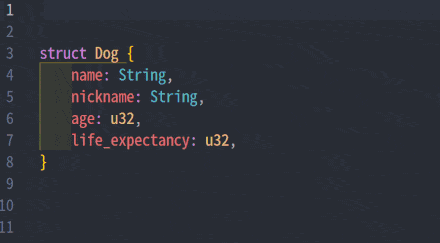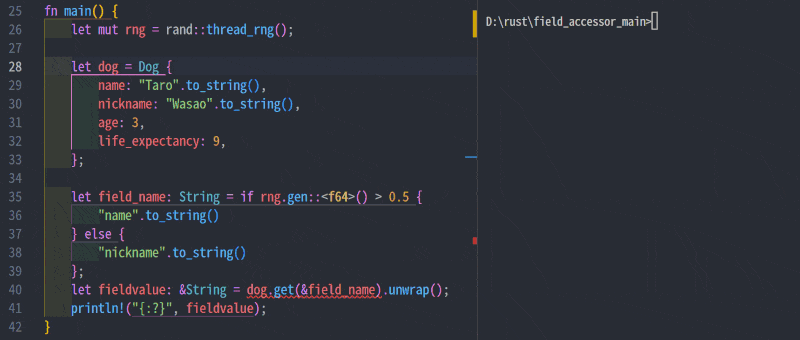10 releases (4 breaking)
| 0.5.2 | Aug 29, 2022 |
|---|---|
| 0.5.1 | May 10, 2022 |
| 0.4.3 | May 8, 2022 |
| 0.3.0 | May 5, 2022 |
| 0.1.0 | May 4, 2022 |
#1739 in Data structures
219 downloads per month
Used in 3 crates
280KB
185 lines
field_accessor

With this procedural macro, you can dynamically get and update a field of the struct by a String type variable.
It can be good for you if you don't know which field you want when compiling. The functionality is similar to python's getattr, setattr.
Installation
[dependencies]
field_accessor = "0"
About this macro
This macro provides the four methods for structs. Only for get, set, to deal with different types of each field, I defined GetterSetter<T> trait and implemented it for each type.
trait GetterSetter<T> {
fn get(&self, field_string: &String) -> Result<&T, String>;
fn set(&mut self, field_string: &String, value: T) -> Result<(), String>;
}
//implement for each type
impl GetterSetter<String> for StructName {
fn get(&self, field_string: &String) -> Result<&String, String>;
fn set(&mut self, field_string: &String, value: String) -> Result<(), String>;
}
impl GetterSetter<u32> for StructName {
fn get(&self, field_string: &String) -> Result<&u32, String>;
fn set(&mut self, field_string: &String, value: u32) -> Result<(), String>;
}
etc...
get
fn get(&self, field_string: &String) -> Result<&T, String>;
It returns a field's value. Note that you need to specify the return type.
get_mut
fn get_mut(&mut self, field_string: &String) -> Result<&mut T, String>;
Returns a mutable reference to the field corresponding to the field_string.
set
fn set(&mut self, field_string: &String, value: String) -> Result<(), String>;
It updates a field's value.
take
fn take(&mut self, field_string: &String) -> Result<T, String>;
Replaces a field's value with the default value of T, returning the previous field's value.
swap
fn swap(&mut self, field_string: &String, field_string_y: &String) -> Result<(), String>;
Swaps the values at two fields, without deinitializing either one.
replace
fn replace(&mut self, field_string: &String, src: T) -> Result<T, String>;
Moves src into the field, returning the previous field's value.
getenum
fn getenum(&self, field_string: &String) -> Result<(StructName)FieldEnum, String>;
It returns a field's value like as get method, but the return type is enum. This method is helpful when field types vary. I will explain about enum later.
getstructinfo
fn getstructinfo(&self) -> (StructName)StructInfo;
You can extract a struct's field names, types, and a struct name.
Usage and Example

use field_accessor::FieldAccessor;
#[derive(FieldAccessor)]
struct Dog {
name: String,
age: u32,
life_expectancy: u32,
}
fn main() {
let mut dog = Dog {
name: "Taro".to_string(),
age: 3,
life_expectancy: 9,
};
let field_name = "name".to_string();
let value_to_update = "Jiro".to_string();
dog.set(&field_name, value_to_update).unwrap();
let value_on_error;
let fieldvalue: &String = match dog.get(&"invalid_field".to_string()) {
Ok(value) => value,
Err(_) => {value_on_error = "Ken".to_string(); &value_on_error},
};
println!("{:?}", fieldvalue);
let field_name = "age".to_string();
let value_to_update = 4u32;
dog.set(&field_name, value_to_update).unwrap();
let fieldvalue: &u32 = dog.get(&field_name).unwrap();
println!("{:?}", fieldvalue);
let field_name = "life_expectancy".to_string();
let value_to_update = 10u32;
dog.set(&field_name, value_to_update).unwrap();
let fieldvalue: &u32 = dog.get(&field_name).unwrap();
println!("{:?}", fieldvalue);
}
output
"Ken"
4
10
This code is generated at compiling.
Known issues
You need to specify the data type of the returned value. If it is not given, the compiler cannot infer the type. This restriction reduces the convenience of using this macro.
#[derive(FieldAccessor)]
struct Dog {
name: String,
age: u32,
life_expectancy: u32,
}
let mut dog = Dog {
name: "Taro".to_string(),
age: 3,
life_expectancy: 9,
};
let fields = vec![
"name".to_string(),
"age".to_string(),
"life_expectancy".to_string(),
]
for field_name in fields.into_iter(){
let fieldvalue = dog.get(&field_name).unwrap();
};
This code raises an error.
let fieldvalue = dog.get(&field_name).unwrap();
---------- ^^^ cannot infer type for type parameter `T` declared on the trait `GetterSetter`
|
consider giving `fieldvalue` the explicit type `&T`, where the type parameter `T` is specified
A workaround is to replace get with getenum. This macro defines (struct name)FieldEnum behind the scenes for you like below.
enum DogFieldEnum {
name(String),
age(u32),
life_expectancy(u32),
}
You can use this as a return type. With this enum you can get any field's value without concerning a field's type.
let mut dog = Dog {
name: "Taro".to_string(),
age: 3,
life_expectancy: 9,
};
let fields = vec![
"name".to_string(),
"age".to_string(),
"life_expectancy".to_string(),
];
let mut fieldvalues: Vec<DogFieldEnum> = vec![];
for field_name in fields.into_iter(){
fieldvalues.push(dog.getenum(&field_name).unwrap());
};
assert_eq!(fieldvalues[0], DogFieldEnum::name("Taro".to_string()));
assert_eq!(fieldvalues[1], DogFieldEnum::age(3));
Getting struct's information
You can get the information of the struct with (field name)StructInfo by calling getstructinfo.
Definition of (field name)StructInfo
struct DogStructInfo {
field_names: Vec<String>,
field_types: Vec<String>,
struct_name: String
}
Example
let info = dog.getstructinfo();
println!("{:?}", info);
for i in info.field_names.iter() {
let fieldvalue: DogFieldEnum = dog.getenum(i).unwrap();
println!("{:?}", fieldvalue);
}
output
DogStructInfo { field_names: ["name", "age", "life_expectancy"], field_types: ["String", "u32", "u32"], struct_name: "Dog" }
name("Jiro")
age(4)
life_expectancy(10)
Author
Tomohiro Endo (europeanplaice@gmail.com)
Dependencies
~1.5MB
~38K SLoC